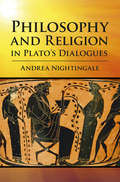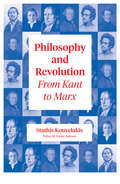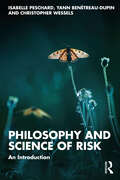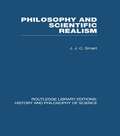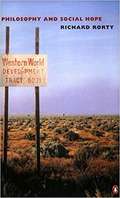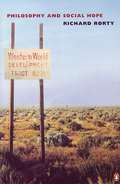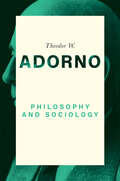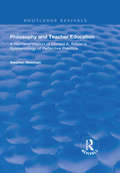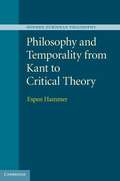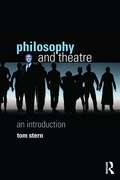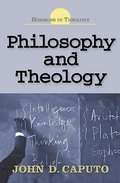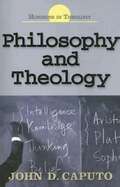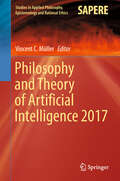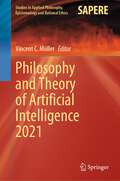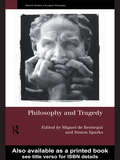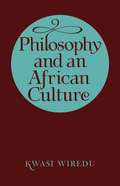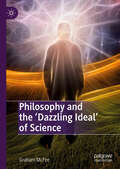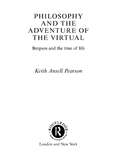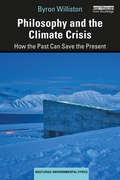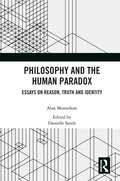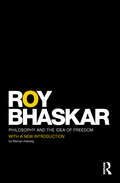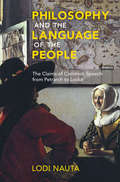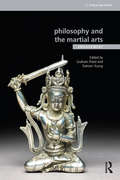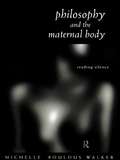- Table View
- List View
Philosophy and Religion in Plato's Dialogues
by Andrea NightingaleIn ancient Greece, philosophers developed new and dazzling ideas about divinity, drawing on the deep well of poetry, myth, and religious practices even as they set out to construct new theological ideas. Andrea Nightingale argues that Plato shared in this culture and appropriates specific Greek religious discourses and practices to present his metaphysical philosophy. In particular, he uses the Greek conception of divine epiphany - a god appearing to humans - to claim that the Forms manifest their divinity epiphanically to the philosopher, with the result that the human soul becomes divine by contemplating these Forms and the cosmos. Nightingale also offers a detailed discussion of the Eleusinian Mysteries and the Orphic Mysteries and shows how these mystery religions influenced Plato's thinking. This book offers a robust challenge to the idea that Plato is a secular thinker.
Philosophy and Revolution: From Kant to Marx
by Stathis KouvelakisThroughout the nineteenth century, German philosophy was haunted by the specter of the French Revolution. Kant, Hegel and their followers spent their lives wrestling with its heritage, trying to imagine a specifically German path to modernity: a "revolution without revolution." Trapped in a politically ossified society, German intellectuals were driven to brood over the nature of the revolutionary experience.In this ambitious and original study, Stathis Kouvelakis paints a rich panorama of the key intellectual and political figures in the effervescence of German thought before the 1848 revolutions. He shows how the attempt to chart a moderate, reformist path entered into crisis, generating two antagonistic perspectives within the progressive currents of German society. On the one side were those socialists—among them Moses Hess and the young Friedrich Engels—who sought to discover a principle of harmony in social relations, bypassing the question of revolutionary politics. On the other side, the poet Heinrich Heine and the young Karl Marx developed a new perspective, articulating revolutionary rupture, proletarian hegemony and struggle for democracy, thereby redefining the very notion of politics itself.
Philosophy and Science of Risk: An Introduction
by Isabelle Peschard Yann Benétreau-Dupin Christopher WesselsWhat is risk? How do we assess risk? What are the ethical implications of risk? The concept of risk is important – sometimes even crucial – for many philosophical domains, from philosophy of science and technology to ethics and sustainability. Philosophy and Science of Risk is a clear, wide-ranging introduction to this urgent and fast-growing subject. It covers the following key topics: • The philosophical and historical background to understanding and interpreting risk • The meaning of risk and how it differs from closely related concepts, such as uncertainty or dangers • The social construction of risk • Risk perception and risk as an object of scientific study • The measurement of risk, its probability and severity • Risk and scientific modeling • Risk, value judgments, and expertise • Risk management, including cost-benefit analysis and the precautionary approach • Risk communication, including deliberative models • Ethics of risk, including duties toward nonhuman animals and future generations • Risk and sustainability • Decision-making under risk Including helpful additional features such as text boxes, chapter summaries, review, and discussion questions, Philosophy and Science of Risk: An Introduction is an ideal textbook for students of the philosophy of risk. It is also suitable for students studying the conceptual questions surrounding risk in related subjects, such as sociology, psychology, economics, politics, geography, sustainability, and environmental studies.
Philosophy and Scientific Realism (Routledge Library Editions: History & Philosophy of Science)
by J J SmartOriginally published in 1963. In an introductory chapter the author argues that philosophy ought to be more than the art of clarifying thought and that it should concern itself with outlining a scientifically plausible world view. Early chapters deal with phenomenalism and the reality of theoretical entities, and with the relation between the physical and biological sciences. Free will, issues of time and space and man’s place in nature are covered in later chapters.
Philosophy and Social Hope
by Richard RortyRichard Rorty is one of the most provocative figures in recent philosophical, literary and cultural debate. This collection brings together those of his writings aimed at a wider audience, many published in book form for the first time. In these eloquent essays, articles and lectures, Rorty gives a stimulating summary of his central philosophical beliefs and how they relate to his political hopes; he also offers some challenging insights into contemporary America, justice, education and love.
Philosophy and Social Hope
by Richard RortyRichard Rorty is one of the most provocative figures in recent philosophical, literary and cultural debate. This collection brings together those of his writings aimed at a wider audience, many published in book form for the first time. In these eloquent essays, articles and lectures, Rorty gives a stimulating summary of his central philosophical beliefs and how they relate to his political hopes; he also offers some challenging insights into contemporary America, justice, education and love.
Philosophy and Sociology: 1960
by Theodor W. AdornoIn summer 1960, Adorno gave the first of a series of lectures devoted to the relation between sociology and philosophy. One of his central concerns was to dispel the notion, erroneous in his view, that these were two incompatible disciplines, radically opposed in their methods and aims, a notion that was shared by many. While some sociologists were inclined to dismiss philosophy as obsolete and incapable of dealing with the pressing social problems of our time, many philosophers, influenced by Kant, believed that philosophical reflection must remain ‘pure’, investigating the constitution of knowledge and experience without reference to any real or material factors. By focusing on the problem of truth, Adorno seeks to show that philosophy and sociology share much more in common than many of their practitioners are inclined to assume. Drawing on intellectual history, Adorno demonstrates the connection between truth and social context, arguing that there is no truth that cannot be manipulated by ideology and no theorem that can be wholly detached from social and historical considerations. This systematic account on the interconnectedness of philosophy and sociology makes these lectures a timeless reflection on the nature of these disciplines and an excellent introduction to critical theory, the sociological content of which is here outlined in detail by Adorno for the first time.
Philosophy and Teacher Education: A Reinterpretation of Donald A.Schon's Epistemology of Reflective Practice (Routledge Revivals)
by Stephen NewmanPublished in 1999, this text sets out to give a reinterpretation of Schon's work. It breaks new ground by looking systematically at the entirety of his writings, by identifying critical difficulties with Schon's work, and by subjecting his work to reinterpretation.
Philosophy and Temporality from Kant to Critical Theory
by Espen HammerThis book is a critical analysis of how key philosophers in the European tradition have responded to the emergence of a modern conception of temporality. Espen Hammer suggests that it is a feature of Western modernity that time has been forcibly separated from the natural cycles and processes with which it used to be associated. In a discussion that ranges over Kant, Hegel, Schopenhauer, Nietzsche, Heidegger and Adorno, he examines the forms of dissatisfaction which result from this, together with narrative modes of configuring time, the relationship between agency and temporality, and possible challenges to the modern world's linear and homogenous experience of time. His study is a rich exploration of an enduring philosophical theme: the role of temporality in shaping and reshaping modern human affairs.
Philosophy and Theatre: An Introduction
by Tom SternThe relationship between philosophy and theatre is a central theme in the writings of Plato and Aristotle and of dramatists from Aristophanes to Stoppard. Where Plato argued that playwrights and actors should be banished from the ideal city for their suspect imitations of reality, Aristotle argued that theatre, particularly tragedy, was vital for stimulating our emotions and helping us to understanding ourselves. Despite this rich history the study of philosophy and theatre has been largely overlooked in contemporary philosophy. This is the first book to introduce philosophy and theatre. It covers key topics and debates, presenting the contributions of major figures in the history of philosophy, including: what is theatre? How does theatre compare with other arts? theatre as imitation, including Plato on mimesis truth and illusion in the theatre, including Nietzsche on tragedy theatre as history theatre and morality, including Rousseau’s criticisms of theatre audience and emotion, including Aristotle on catharsis theatre and politics, including Brecht’s Epic Theatre. Including annotated further reading and summaries at the end of each chapter, Philosophy and Theatre is an ideal starting point for those studying philosophy, theatre studies and related subjects in the arts and humanities.
Philosophy and Theology
by John D. CaputoA highly engaging essay that will draw students into a conversation about the vital relationship between philosophy and theology. John D. Caputo addresses the great and classical philosophical questions as they inextricably intersect with theology.
Philosophy and Theology: A Theology Of Difficult Glory (Horizons in Theology)
by John CaputoA highly engaging essay that will draw students into a conversation about the vital relationship between philosophy and theology.In this clear, concise, and brilliantly engaging essay, renowned philosopher and theologian John D. Caputo addresses the great and classical philosophical questions as they inextricably intersect with theology--past, present, and future. Recognized as one of the leading philosophers, Caputo is peerless in introducing and initiating students into the vital relationship that philosophy and theology share together. He writes, “If you take a long enough look, beyond the debates that divide philosophy and theology, over the walls that they have built to keep each other out or beyond the wars to subordinate one to the other, you find a common sense of awe, a common gasp of surprise or astonishment, like looking out at the endless sprawl of stars across the evening sky or upon the waves of a midnight sea.”
Philosophy and Theory of Artificial Intelligence 2017 (Studies in Applied Philosophy, Epistemology and Rational Ethics #44)
by Vincent C. MüllerThis book reports on the results of the third edition of the premier conference in the field of philosophy of artificial intelligence, PT-AI 2017, held on November 4 - 5, 2017 at the University of Leeds, UK. It covers: advanced knowledge on key AI concepts, including complexity, computation, creativity, embodiment, representation and superintelligence; cutting-edge ethical issues, such as the AI impact on human dignity and society, responsibilities and rights of machines, as well as AI threats to humanity and AI safety; and cutting-edge developments in techniques to achieve AI, including machine learning, neural networks, dynamical systems. The book also discusses important applications of AI, including big data analytics, expert systems, cognitive architectures, and robotics. It offers a timely, yet very comprehensive snapshot of what is going on in the field of AI, especially at the interfaces between philosophy, cognitive science, ethics and computing.
Philosophy and Theory of Artificial Intelligence 2021 (Studies in Applied Philosophy, Epistemology and Rational Ethics #63)
by Vincent C. MüllerThis book gathers contributions from the fourth edition of the Conference on "Philosophy and Theory of Artificial Intelligence" (PT-AI), held on 27-28th of September 2021 at Chalmers University of Technology, in Gothenburg, Sweden. It covers topics at the interface between philosophy, cognitive science, ethics and computing. It discusses advanced theories fostering the understanding of human cognition, human autonomy, dignity and morality, and the development of corresponding artificial cognitive structures, analyzing important aspects of the relationship between humans and AI systems, including the ethics of AI. This book offers a thought-provoking snapshot of what is currently going on, and what are the main challenges, in the multidisciplinary field of the philosophy of artificial intelligence.
Philosophy and Tragedy (Warwick Studies in European Philosophy)
by Miguel De Beistegui Simon SparksFrom Plato's Republic and Aristotle's Poetics to Nietzsche's The Birth of Tragedy, the theme of tragedy has been subject to radically conflicting philosophical interpretations. Despite being at the heart of philosophical debate from Ancient Greece to the Nineteenth Century, however, tragedy has yet to receive proper treatment as a philosophical tradition in its own right. Philosophy and Tragedy is a compelling contribution to that oversight and the first book to address the topic in a major way. Eleven new essays by internationally renowned philosophers clearly show how time and again, major thinkers have returned to tragedy in many of their key works. Philosophy and Tragedy aks why it is that thinkers as far apart as Hegel and Benjamin should make tragedy such an important theme in their work, and why, after Kant, an important strand of philosophy should present itself tragically. From Heidegger's reading of Sophocles' Antigone to Nietzsche and Benjamin's book-length studies of tragedy, Philosophy and Tragedy presents an outstanding and original study of this preoccupation. The five sections are organised clearly around five major philosophers: Hegel, Holderlin, Nietzsche, Heidegger, and Benjamin
Philosophy and an African Culture
by Kwasi WireduWhat can philosophy contribute to African culture? What can it draw from it? Could there be a truly African philosophy that goes beyond traditional folk thought? Kwasi Wiredu tries in these essays to define and demonstrate a role for contemporary African philosophers which is distinctive but by no means parochial. He shows how they can assimilate the advances of analytical philosophy and apply them to the general social and intellectual changes associated with 'modernisation' and the transition to new national identities. But we see too how they can exploit traditional resources and test the assumptions of Western philosophy against the intimations of their own language and culture. The volume as a whole presents some of the best non-technical work of a distinguished African philosopher, of importance equally to professional philosophers and to those with a more general interest in contemporary African thought and culture.
Philosophy and the 'Dazzling Ideal' of Science
by Graham McFeeRecent decades have seen attacks on philosophy as an irrelevant field of inquiry when compared with science. In this book, Graham McFee defends the claims of philosophy against attempts to minimize either philosophy’s possibility or its importance by deploying a contrast with what Wittgenstein characterized as the “dazzling ideal” of science. This ‘dazzling ideal’ incorporates both the imagined completeness of scientific explanation—whereby completing its project would leave nothing unexplained—and the exceptionless character of the associated conception of causality. On such a scientistic world-view, what need is there for philosophy? In his defense of philosophy (and its truth-claims), McFee shows that rejecting such scientism is not automatically anti-scientific, and that it permits granting to natural science (properly understood) its own truth-generating power. Further, McFee argues for contextualism in the project of philosophy, and sets aside the pervasive (and pernicious) requirement for exceptionless generalizations while relating his account to interconnections between the concepts of person, substance, agency, and causation.
Philosophy and the Adventure of the Virtual: Bergson And The Time Of Life
by Keith Ansell-Pearson Keith Ansell PearsonWith the development of new technologies and the Internet, the notion of the virtual has grown increasingly important. In this lucid collection of essays, Pearson bridges the continental-analytic divide in philosophy, bringing the virtual to centre stage and arguing its importance for re-thinking such central philosophical questions as time and life. Drawing on philosophers from Bergson, Kant and Nietzsche to Proust, Russell, Dennett and Badiou, Pearson examines the limits of continuity, explores relativity, and offers a concept of creative evolution.
Philosophy and the Climate Crisis: How the Past Can Save the Present (Routledge Environmental Ethics)
by Byron WillistonThis book explores how the history of philosophy can orient us to the new reality brought on by the climate crisis. If we understand the climate crisis as a deeply existential one, it can help to examine the way past philosophers responded to similar crises in their times. This book explores five past crises, each involving a unique form of collective trauma. These events—war, occupation, exile, scientific revolution and political revolution—inspired the philosophers to remake the whole world in thought, to construct a metaphysics. Williston distills a key intellectual innovation from each metaphysical system: • That political power must be constrained by knowledge of the climate system (Plato) • That ethical and political reasoning must be informed by care or love of the ecological whole (Augustine) • That we must enhance the design of the technosphere (Descartes) • That we must conceive the Earth as an internally complex system (Spinoza) • And that we must grant rights to anyone or anything—ultimately the Earth system itself—whose vital interests are threatened by the effects of climate change (Hegel). Philosophy and the Climate Crisis will be of great interest to students and scholars of climate change, environmental philosophy and ethics and the environmental humanities.
Philosophy and the Foundations of Dynamics
by Lawrence SklarAlthough now replaced by more modern theories, classical mechanics remains a core foundational element of physical theory. From its inception, the theory of dynamics has been riddled with conceptual issues and differing philosophical interpretations and throughout its long historical development, it has shown subtle conceptual refinement. The interpretive program for the theory has also shown deep evolutionary change over time. Lawrence Sklar discusses crucial issues in the central theory from which contemporary foundational theories are derived and shows how some core issues (the nature of force, the place of absolute reference frames) have nevertheless remained deep puzzles despite the increasingly sophisticated understanding of the theory which has been acquired over time. His book will be of great interest to philosophers of science, philosophers in general and physicists concerned with foundational interpretive issues in their field.
Philosophy and the Human Paradox: Essays on Reason, Truth and Identity
by Alan MontefioreThis book collects essays by Alan Montefiore on the role philosophy plays in the formation of the self, and how philosophical questions regarding the nature of reason, truth, and identity inform ethics and politics. It offers a comprehensive overview of Montefiore’s influential, non-dogmatic philosophical voice. Throughout his 70-year career, Montefiore sought to bridge the analytic/continental divide and develop a new way of thinking about philosophy. He defines philosophy as the search for a higher-order understanding of whatever the situation or activity in which one may be involved or engaged, an understanding which may be achieved and expressed by and in a variety of different forms of philosophical persuasion, and which may serve to shed new light on particular problems. The book’s essays, half of which are previously unpublished, are divided into two thematic sections. The first focuses on the nature of philosophy, while the second addresses the relationship between philosophy and moral and political responsibilities. Philosophy and the Human Paradox will be of interest to philosophers and students who work on ethics, Kantian and post-Kantian continental philosophy, and political philosophy.
Philosophy and the Idea of Freedom (Classical Texts in Critical Realism (Routledge Critical Realism))
by Roy BhaskarFirst published in 2011. Routledge is an imprint of Taylor & Francis, an informa company.
Philosophy and the Language of the People: The Claims of Common Speech from Petrarch to Locke
by Lodi NautaWhich language should philosophers use: technical or common language? In a book as important for intellectual historians as it is for philosophers, Lodi Nauta addresses a vital question which still has resonance today: is the discipline of philosophy assisted or disadvantaged by employing a special vocabulary? By the Middle Ages philosophy had become a highly technical discipline, with its own lexicon and methods. The Renaissance humanist critique of this specialised language has been dismissed as philosophically superficial, but the author demonstrates that it makes a crucial point: it is through the misuse of language that philosophical problems arise. He charts the influence of this critique on early modern philosophers, including Hobbes and Locke, and shows how it led to the downfall of medieval Aristotelianism and the gradual democratization of language and knowledge. His book will be essential reading for anyone interested in the transition from medieval to modern philosophy.
Philosophy and the Martial Arts: Engagement (Ethics and Sport)
by Graham Priest Damon YoungThis is the first substantial academic book to lay out the philosophical terrain within the study of the martial arts and to explore the significance of this fascinating subject for contemporary philosophy. The book is divided into three sections. The first section concerns what philosophical reflection can teach us about the martial arts, and especially the nature and value of its practice. The second section deals with the other direction of the dialectical interplay between philosophy and the martial arts: how the martial arts can inform philosophical issues important in their own right. Finally, because many of the notable martial arts are of Asian origin, there are particularly close links between the arts and Asian philosophies – and Buddhism in particular – and therefore the last section is devoted to this topic. The essays in this collection deal with a wide range of philosophical issues: normative ethics, meta-ethics, aesthetics, phenomenology, the philosophy of mind, Ancient Greek and Buddhist thought. By demonstrating the very real nature of the engagement between the martial arts and philosophy, this book is essential reading for any serious student or scholar with an interest in the martial arts, Eastern philosophy, the philosophy of sport, or the study of physical culture.
Philosophy and the Maternal Body: Reading Silence
by Michelle Boulous WalkerPhilosophy and the Maternal Body gives a new voice to the mother and the maternal body which have often been viewed as silent within philosophy. Michelle Boulous Walker clearly shows how some male theorists have appropriated maternity, and suggests new ways of articulating the maternal body and women's experience of pregnancy and motherhood.
